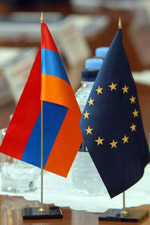Political parties have already started the pre-election campaign. However, none of these parties is paying a due attention to the Euro zone crisis and the possible impact in their platforms and speeches.
While we prefer not to speak of the crisis, the first results are becoming more and more evident. Meantime, it first of all is seen not in the Euro zone but Armenia.
Two weeks ago the national statistics service published a preliminary report for January. The report shows that the foreign trade statistics is not so optimistic. The import has grown compared to the previous year by 6.6%, and the export – by 0.4%. In fact there has been no growth of export. If we take into consideration the factor of prices, it means that the real volume of export has reduced. However, last year in January the statistics reported more than 20% growth of export.
This is what we knew two weeks ago. What has changed during this week? A couple of days ago the statistics service published the monthly report for January, which contains detailed information about different sectors of the economy.
A brief look at the foreign trade statistics shows that the situation is becoming worse. The export volume in January was 71 million dollars and the growth was 0.4%. The export proportion for the CIS countries grew by 11.9% and amounted 11.3 million dollars. As a result, the proportion of the CIS countries grew from 15.9% to 17.7% in the overall volume for export.
Instead of that, the trade circulation with the European Union has fallen drastically. The export capacity to European countries in January of this year was less by 9.2% than in the same month of the previous year. As a result, the overall volume of export to European countries in the entire export capacity reduced from 50.5% to 46.6%.
The export to Germany reduced by 15.4%. It is worth mentioning that the export to Germany was 12.7% in the entire export volume.
The trade volume with Turkey has reduced by 17.3% and amounted 6.4 million dollars in January. This is equal to the 1.9% of the entire trade volume (in January of last year it was 2.4%). This is not small export in consideration of the fact that the borders are closed. However, the export to Turkey was very small, which means that we are only importing from that country.
According to the statistics reported in January, this year we have more integrated not with Europe but the former Soviet Union area. On the other hand, maybe the demand on the part of the Euro zone countries has reduced. It is difficult to say whether it is a result of the crisis. The demand and reduction of the demand in EU countries for products made in Armenia directly impacts our economy. This is what we mean above saying that the first results of the crisis in Euro zone are seen already.
The mining and precious metals sectors cover a larger share in the export volume, and this year the export of products on the part of these sectors has reduced too. The past experience shows that during crisis these two sectors are the most vulnerable ones.
The growth in export has been mainly provided by food, animals, precious stones, which did not let the indicator of export be negative. In order not to finish the article with a pessimistic note, we are happy to inform that the forecasts concerning the euro zone crisis are milder now. Recently the European Central Bank issued 530 billion Euros to European banks with 1% interest rate and 3 years of coverage. The Standard & Poors agency reports that due to this decision on the part of the European Bank it is hardly possible that there may be crisis of liquidity of the European financial system, and the recession in the Euro zone countries will be milder. Even though the Standard & Poors does not exclude the possibility that there may be a new crisis in three years (if the banks fail to return the borrowings), we hope that everything will have a happy end.

